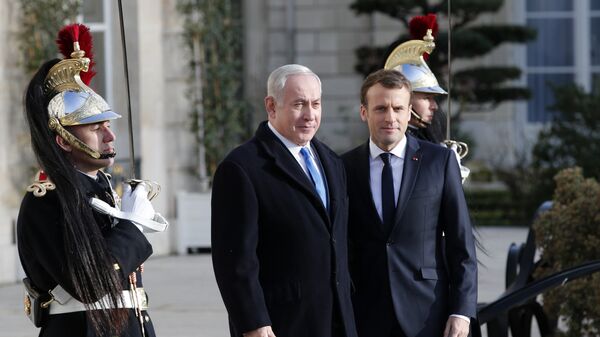During his Tuesday talks with Israeli Prime Minister Benjamin Netanyahu, French President Emmanuel Macron stated that Paris shared Tel Aviv's concern over Iran's activity in the Middle East.
Speaking about the recent development in the Iran nuclear deal on the heels of the US withdrawal from it in May, the top French official stressed the importance of the agreement, providing that it is complemented by an additional accord that would target Iran's ballistic missile program.
ממשיך במסע המדיני - עכשיו בארמון האליזה עם הנשיא מקרון: pic.twitter.com/T7rg1HtwuS
— Benjamin Netanyahu (@netanyahu) June 5, 2018
Netanyahu responded that he isn't seeking a French withdrawal from the 2015 Iran deal.
"I didn't ask France to withdraw from JCPOA because I think it will be dissolved by weight of economic forces," the Israeli official said.
The deal, considered to be a diplomatic victory of former US President Barack Obama, has been put in question by current US President Donald Trump, who first pointed to the alleged "flaws" in it and then withdrew from the agreement on May 8, 2018. In addition, the US president decided to reinstate the sanctions on Iran previously lifted under the JCPOA. The unilateral move has been opposed by other signatories, such as the European Union and Russia.
PM Netanyahu was welcomed by French President Emmanuel Macron, with an honor guard, at the Elysee Palace in Paris.
— Ofir Gendelman (@ofirgendelman) June 5, 2018
The leaders are currently holding a private meeting; afterwards they will hold an expanded meeting with their entourages. pic.twitter.com/x9Z6TMoHsJ
The Joint Comprehensive Plan of Action (JCPOA) was signed in 2015 by Iran, the European Union and the P5+1 group of countries - China, Germany, France, Russia, the United Kingdom and the United States. The deal stipulates the gradual lifting of the anti-Iranian sanctions in exchange for Tehran maintaining the peaceful nature of its nuclear program.
The Issue of Gaza Strip
The French president touched upon the recent spike of violence that has occurred on the Israel-Gaza border amid Palestinian protests called the Great March of Return. The protests especially intensified on the day that the US embassy opened in the disputed city of Jerusalem.
"If this leads to people dying it's not a celebration," he stated, adding that the move doesn't promote peace efforts and has prompted violence in the region.
The embassy's opening ceremony and the subsequent clashes between Palestinian protesters and the Israeli Defense Forces resulted in the deaths of 60 protesters and over 2,700 others wounded.
In late May, Israel reported numerous missile strikes from Gaza, which prompted the launch of an anti-terror operation in the enclave.
Netanyahu Meets With Jewish community in Paris
Prior to the meeting with Macron, Netanyahu and his wife Sara met with leaders of the Jewish community in Paris, speaking about Israel-France relations, recent waves of anti-Semitic attacks and the threat of radical Islam.
"We are preventing terrible attacks, including here, in France. Israel has stopped a great deal of attacks in Europe and will continue to do so," Netanyahu said.
Prime Minister Benjamin Netanyahu departed today for a round of diplomatic meetings in Berlin, Paris and London. He will meet with German Chancellor Angela Merkel, with French President Emmanuel Macron, and with British Prime Minister Theresa May.https://t.co/Yl9W7hmZjV pic.twitter.com/54cOzcmxVe
— PM of Israel (@IsraeliPM) June 4, 2018


